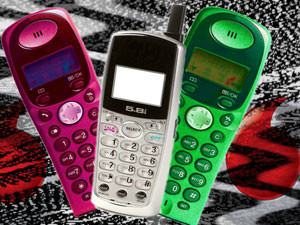
While the Independent Communications Authority of SA (ICASA) says it is acting on complaints that illegal cordless telephones are interfering with Vodacom's network, the operator claims requests for the authority to confiscate the equipment have landed on deaf ears.
Cordless phones being used in SA illegally have been the bane of Vodacom's Cape Town network for over two years, as the operator continues to tussle with SA's communications authority for support in confiscating the illegal equipment.
Illegally imported Digital Enhanced Cordless Telecommunications (DECT) phones, which operate in Vodacom's 3G frequency band, interfere with the operator's network, particularly in the Western Cape - a problem Vodacom says is ongoing and "highly frustrating".
The "no name brand" DECT handsets, which are being brought into SA and sold in their thousands, are not licensed to operate in SA and are not type-approved by ICASA.
MTN, Cell C and 8ta are yet to confirm whether their respective networks have had similar issues. However, Richard Boorman, executive head of corporate communications at Vodacom, says the DECT equipment uses the frequency specifically assigned to Vodacom. "I think that we are the only operator affected."
Irate customers
Vodacom, SA's largest mobile operator, believes ICASA "could be more vigorous" in its enforcement of communications law, as the issue "is having a serious detrimental effect on the service for customers in affected areas".
The company says it has been receiving frequent complaints of poor or no cellphone reception from Cape Town customers - particularly in Somerset West and Sea Point - for some time now, and the problem is growing.
Because customers are not aware of the root cause, says Vodacom, they blame Vodacom's network, which impacts the company's service and reputation.
ICASA inaction?
Vodacom says, while it has gone to various lengths to track down the source of the illegal handsets and report such to ICASA, the authority is not coming to the party. "We are struggling to get support from ICASA to enforce the removal of the illegal equipment once we identify it."
Boorman says Vodacom is only made aware of the problem when complaints start to pour in. "[Then] we have to spend considerable time going through a range of investigations to pinpoint the cause. Once it's determined that the cause isn't a network or a handset issue, we'll then employ specialised equipment to track down and pinpoint the source of the interference."
Boorman says Vodacom cannot, in its capacity, enforce the removal of the illegal equipment. "That has to be performed by ICASA. In the Sea Point case, this was referred to ICASA many months ago and still has not been addressed."
Authority enactment
ICASA spokesperson Paseka Maleka says the authority is currently working with Vodacom on addressing interference problems that have been reported. "The authority has been able to address most of the complaints and there are outstanding cases, which we are still working together with them to address."
Maleka says, upon interference complaints, the authority sends inspectors to trace the source of the reported problem, "which then culminates in seizing and sealing such interfering devices".
He says, while it is difficult to gauge how rife the problem of illegal DECT handsets is, "we believe there are a lot of these phones out there". Maleka notes that, despite continual confiscations exercises, "people continue to travel to other countries outside of the region and bring [these phones] in".
Judging by a 2004 statement from ICASA warning consumers not to purchase certain cordless phones, the problem dates years back.
Ironic status quo
World Wide Worx MD Arthur Goldstuck says ICASA is "terribly under-resourced" and the confiscation of illegal cordless handsets is probably low on its priority list.
Goldstuck notes the volumes that go through suppliers of the no-name brand phones - for instance flea market vendors - are huge. "[The high volumes] are enough to make a difference to network quality and should be of concern for ICASA."
Meanwhile, network operators are still required to provide ICASA with reports every six months showing networks are available more than 95% of the time, the rate of failed calls does not exceed 3%, and that 90% of all faults are cleared within three days. If they do not meet these requirements, they face fines.
ICASA launched the end-user and subscriber service charter in the middle of 2009. The first set of reports, released in August, showed SA's telecoms operators - including Vodacom, MTN, Cell C, iBurst, Neotel, Telkom, Sentech and Internet Solutions - did not live up to regulatory requirements.
Share